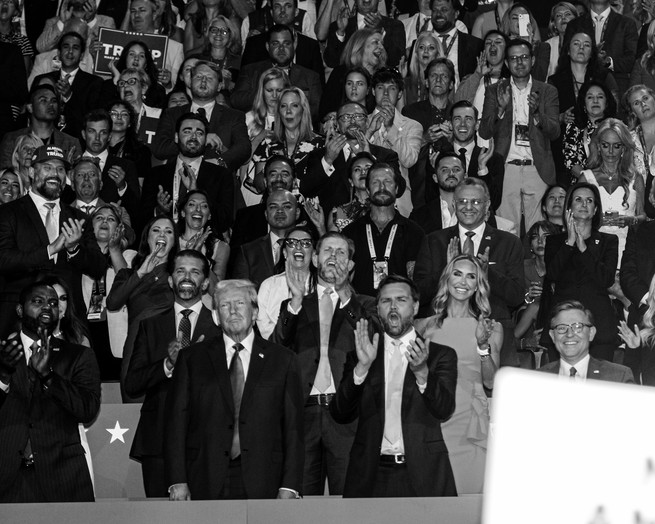A Party of Purified Trump
4 min read
It would be wrong to say that Republicans are now fully in alignment on all matters related to Donald Trump, that the intraparty debates about their nominee have been settled.
For starters, there is this question: Should he be addressed from the podium as “President Donald J. Trump” or “President Donald John Trump?”
Both versions have been in evidence at this week’s Republican National Convention in Milwaukee, with most of the “Donald Johns” coming in official proclamations, such as the state-by-state roll call of delegates on Monday night, and the “Donald J.”s coming from adoring speakers. It is not clear whether Trump himself has taken an official position on this. His fervent followers at least seem to agree that adding a middle accoutrement between his first and last names confers the full historical weight to which Trump is entitled. (Think John F. Kennedy, Ulysses S. Grant, and P. T. Barnum.)
The speakers in Milwaukee also seem to agree that Trump still prizes the honorific of President. Anyone here reckless enough to utter the words former president is committing an egregious faux pas.
Beyond these small hazards, the watchword of the week has been unity—not a natural state for the GOP in recent years (to wit: the Republican-led House). Clearly, though, this convention has been purified of any resistance elements. Or at least they have been fully silenced. You’d sooner see a flying elephant in Milwaukee than any sign of Liz Cheney, Chris Christie, or Mike Pence. Former Trump resisters who are here—Nikki Haley, Ron DeSantis, Ted Cruz, and Trump’s running mate, J. D. Vance—have been eager to assert, and re-assert, their allegiance.
Trump himself has spent considerable time in his front-and-center box at the Fiserv Forum, observing many of the speeches with the intense stare of a gymnastics judge. The spectacle has been a bit reminiscent of that cringeworthy 2017 Cabinet meeting in which Trump’s lieutenants took turns praising him around the table.

There used to be at least some belief that Republicans in 2024 might move beyond this posture of slavish devotion. Back in February, Haley, the former U.S. ambassador to the United Nations and Trump’s closest challenger in the Republican primary, declared, “I feel no need to kiss the ring.” But this is July. Democrats are a mess, Republicans are sounding giddy, and Trump is looking blessed. “I guess when the person you’re backing dodges a bullet, literally, it has a way of making you feel confident,” Jim Walsh, an alternate delegate from Connecticut, told me, referring to the failed assassination attempt against Trump over the weekend.
Speaking at the RNC on Tuesday night, Haley made what passed for an edgy remark from the podium when she conceded that not everyone agrees with Trump all of the time. (“That’s their problem,” someone yelled from the crowd.) But enough skepticism. “Donald Trump has my strong endorsement, period,” Haley said. Although she had received both cheers and boos when she walked onstage, everyone who was listening stood and clapped at this declaration—Trump included, though he was not smiling. Was he displeased? Perhaps only by the absence of a J or John in Haley’s submission.
Florida Governor Ron DeSantis, another reformed antagonist, was received more generously. He drew a series of big smiles from the nominee, even an apparent chuckle, when he described the current administration as a “Weekend at Bernie’s presidency.” It was one of several sharp anti–Joe Biden lines from DeSantis, who seemed to be comfortable and enjoying himself, in marked contrast to the Ron DeSantis who ran for president earlier this year.
On Monday afternoon, I encountered former Arkansas Governor Asa Hutchinson, another defeated primary challenger, on the Fiserv Forum concourse. Hutchinson told me he had faced little hostility at the convention, despite being one of the few elected Republicans to say he would not vote for Trump if he were convicted of a crime. Hutchinson even appears to have softened his position. “I’ve made some commitments about not voting for a convicted felon,” Hutchinson acknowledged to ABC News this week, when asked whether he might come around to Trump after all. “That feels like a long time ago.”
So does 2016, when the Republicans held their last non-COVID convention, in Cleveland. Many of the delegates were not happy to be there. Cruz, the senator from Texas and first runner-up for the presidential nomination, vowed never to become a “puppy dog” in service to his vanquisher, who had, among other things, suggested that Cruz’s wife was unattractive and that his father had been involved in the JFK assassination. In a defiant address to that convention, Cruz implored delegates to “vote your conscience”—and was booed offstage.
“God Bless Donald J. Trump,” Cruz said, kicking off his remarks in Milwaukee on Tuesday night. He proceeded with a note of simple gratitude: “Let me start by thanking God almighty, for protecting President Trump.”
Looking on from his box, the Republican’s almighty himself looked pleased.



